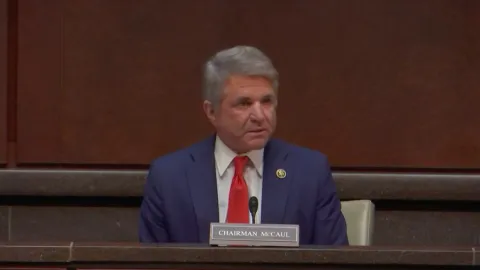Chairman McCaul Delivers Remarks Restricting Outbound U.S. Investment into Chinese Companies
Washington, D.C. - Yesterday, House Foreign Affairs Committee Chairman Michael McCaul delivered the following remarks on his bill, H.R. 6349, the Preventing Adversaries from Developing Critical Capabilities Act, at a full committee markup. The bill, which would protect America's strategic edge and promote a robust national security posture, is widely supported by conservative organizations and the Biden administration. Read the full text of the bill here.
– Remarks as Delivered –
We are facing a generational threat from the Chinese Communist Party.
Make no mistake, the Chinese Communist Party is preparing to fight a war over Taiwan.
Its navy is illegally claiming the South China Sea and ramming the shipping vessels of our allies.
Its security services are using facial recognition, AI, and biometric data to suppress religious and ethnic minorities.
I find it troubling that the United States does not currently restrict American investment dollars into sectors that support these activities.
We can restrict China's access to technology, through export controls, but we can't stop an investor from using their know-how, network, and money to build a CCP giant.
This needs to stop.
Today, we will pass the strongest bill to counter the CCP I've seen in my tenure on this committee and in Congress.
I'd like to specially thank the Ranking Member, Mr. Meeks, for working with me and leading with me on this bill.
We've built quite a coalition together as one nation, with one voice.
In addition to our support, the leads on the Select Committee on China also back this bill.
The administration obviously supports outbound investment restrictions, as reflected in their recent executive order that I was pleased to see after working with Director Estevez of BIS and [Secretary of Commerce] Raimondo.
And so do many conservative groups, including Heritage, Hudson, and American Compass.
But I know one group that really hates this bill—that's the Chinese Communist Party.
That's because this effort targets specific technology sectors, like AI and quantum computing, that are empowering China's military development and surveillance state.
This sector-based, forward-looking approach is the path forward.
We've seen, time and again, the shortcomings of targeting companies one-by-one. They simply change the names of their companies. That backwards looking process has failed and only strengthened the CCP.
Our approach, on the other hand, is comprehensive and preventative.
We know that in these high-tech, dual-use sectors, more U.S. investment only harms national security.
Whether it's one dollar or one billion dollars, U.S. investors should not be involved in these high-tech areas that will shape and define the future.
What we have here is truly a bipartisan piece of legislation that should be expedited to the House Floor.
Indeed, this type of forward-looking, outbound framework is supported by nearly every senator—my dear friend Senator Cornyn has a similar bill, which got over 90 votes in the Senate. It may not be allowed to pass in the National Defense Authorization [Act], but we will pass it out of this committee, and we will pass it out of the House Floor, and we will send it to the Senate, and they will pass it, and it will be signed into law by the President of the United States.
It seems like nearly the entirety of Congress—Republicans and Democrats—agree that U.S. dollars and investment shouldn't be supporting the CCP's development of critical technologies.
The time now calls for bold, new ideas instead of old, failed approaches.
Today, I urge my colleagues to vote in favor of this measure to take the steps necessary to maintain the global balance of power.
###
